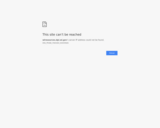
Please Remix this template for your purposes.
- Subject:
- Environmental Literacy and Sustainability
- Information and Technology Literacy
- Social Studies
- Material Type:
- Lesson
- Unit of Study
- Author:
- Sandy Benton
- Liz Bodin
- Date Added:
- 06/01/2022

Please Remix this template for your purposes.
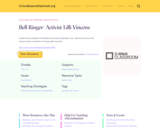
Charles Francis, president of the Mattachine Society of Washington, D.C., talks about the life of Lilli Vincenz and her contributions to the gay rights movement.

This activity was created for an 11th grade Civics class.The goal of this project is for students to use employability skills to work together while experiencing employment opportunities in political science. Students will work to analyze one of the major or minor political parties in the United States. Group’s will attempt to persuade the class that their party’s solutions to the issues, are the best to lead the country.
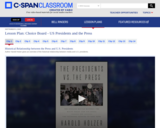
Throughout history, U.S. presidents have carved out their relationships with the press. In this lesson, students will hear from author and historian Harold Holzer as he discusses how several presidents, from George Washington to Donald Trump, navigated their interactions with the media and implemented strategies to communicate with the press, some of which are still used today.
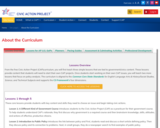
CAP is a free project-based learning program for civics and government. Think of it as a culmination of students’ social studies education, a chance for them to apply what they have learned to the real world and impact an issue that matters to them.
From the CAP curriculum, you will first teach three lessons that are tied to government/civics content. These lessons provide content that students will need to start their own CAP projects. Once students start working on their own CAP issues, you will teach two more lessons that focus on policy analysis.
A CAP project is an issue or problem students select, research and then identify propose and submit a solution for.
CAP provides a bundle of additional lessons for you to choose from, based on the needs and interests of your students.
Students could select issues related to school, community, or even national or global issues. CAP students identify an issue or problem that matters to them, connect it to public policy, then take “civic actions” to try to impact their selected issue/problem. It is up to you, the teacher, if you want to limit the scale of the issues they choose.
In any case, it is key that you require students to make the connection to public policy if you are integrating CAP into your government course.
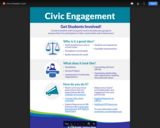
This infographic and supporting resources assist educators and students to contact local government and advocacy groups to advance civic engagement in and out of the classroom. It provides background information on why civic engagement is a good idea, what it looks like in the classroom, and links to community development, university partners, and statewide Chambers of Commerce.
Special thanks to Jim Renzelmann at the Sheboygan Area School District for his help on this work!
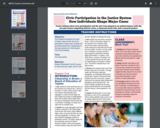
"Teach students about civic participation and the role it has played in our judicial history with this two-part lesson comprising historic cases, a classroom mock trial, and a research project. Objective: Your students will analyze the impact of historic cases and the role of civic participation in these cases. Students will also demonstrate their understanding of the basic elements of a trial through a mock trial proceeding.
Time: Two class periods
Materials: Student Worksheets #1 and #2, access to online resources, paper, pencil or pen"
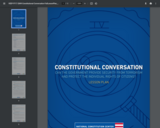
In this series of lessons, first students will read and reflect on the Constitution regarding issues of security and liberty. Next, they will participate in a Reflective Conversation in which students will discuss the issues of security and liberty. Finally, they will expand the conversation to a larger community of peers outside of their school.
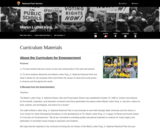
The National Park Service has created a K-12 curriculum that focuses on scaffolded lessons that focus on Martin Luther King’s advocacy, the March on Washington and other leaders of the Civil Rights movement.
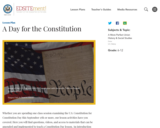
Website with different lessons focusing on:
1.Analyze primary and secondary sources representing conflicting points of view to determine the proper role of government regarding the rights of individuals.
2.Analyze primary and secondary sources representing conflicting points of view to determine the Constitutionality of an issue.
3.Assess the short and long-term consequences of decisions made during the writing of the U.S. Constitution and the Bill of Rights.
4.Compare the components of the U.S. Constitution and Bill of Rights with the Constitutions of other nations.
5.Evaluate contemporary and personal connections to the U.S. Constitution and the Bill of Rights.
6.Compose a reflection and assessment of the significance of Constitution Day and the U.S. Constitution.
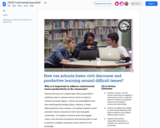
Controversial issues are complex topics that are grounded in conflicting values or opinions and can result in emotional reactions and public dispute. Schools may avoid difficult issues that could bring forth feelings of fear, confusion, or anger. Addressing these issues, however, can motivate students to learn and make relevant connections to their local and global communities. For students to become active and engaged citizens, they will need civil discourse and reasoning skills, as well as tolerance, empathy, compassion, and an interest in civic knowledge.
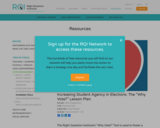
"The Right Question Institute’s “Why Vote?” Tool is used to foster a strong sense of urgency to vote. Voting is framed as a self-advocacy role students can and will want to play. Whether students can or cannot yet vote, they will:
Understand the connection between specific public services they rely on or issues they care about and the role of elected officials
Name for themselves the importance of voting
Ask questions using the Question Formulation Technique (QFT)
Explore ways (in addition to voting) that people can take action and advocate for public services they rely on or issues they care about
This lesson plan is designed to bring elements of the ‘Why Vote’ Tool into the classroom and can be used in remote, hybrid, or fully in person settings."
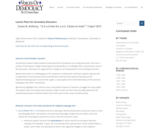
Anthony’s speech helps students understand the Constitution as a living document. She uses a variety of techniques of legal reasoning and interpretation to challenge other, exclusionary uses of the document. She bases an argument for change on an interpretation of a founding document.
Reconstruction is a challenging era for students to understand. Anthony’s speech captures the complexities of the Reconstruction Amendments and how they opened new avenues for disenfranchised groups to assert their rights. It also explores the interrelationship of the women’s suffragists with other movements. Anthony highlights the cultural, social, and political aspects of women’s struggle for equal rights. The speech does not simply assert women’s right to vote, but also more broadly addresses the subordinate position of women within the home and in other areas of public policy.
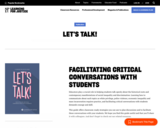
Educators play a crucial role in helping students talk openly about the historical roots and contemporary manifestations of social inequality and discrimination. Learning how to communicate about such topics as white privilege, police violence, economic inequality and mass incarceration requires practice, and facilitating critical conversations with students demands courage and skill.
This guide offers classroom-ready strategies you can use to plan discussions and to facilitate these conversations with your students. Also includes planning documents and resources for further investigation.
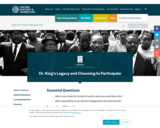
This lesson from Facing History and Ourselves asks students to analyze and storyboard Dr. King's "Mountaintop Speech" and discuss how humans can respond to injustice. It also challenges students to reflect on the world in which they would like to live.
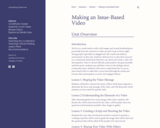
We live in a multi-media world, with images and sounds bombarding us practically from the moment we wake up until we go to bed at night. Young people especially are plugged into this visual and auditory environment. In this unit, students will learn how to take their research on a community-based issue that they care about and create a video. By showing their video to elected officials, policymakers, the general public and their peers, students may add their voices to the dialogue about community issues. Students will come to understand how to use an issue-based video to make their voices heard through the media and increase their participation as active and engaged citizens.
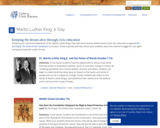
Enhance your classroom experience on Dr. Martin Luther King Jr Day with these teacher-tested lessons from the nationally recognized We the People: The Citizen & the Constitution curriculum. These materials will help inform your students about the national struggle for civil rights and equal protection under the law.
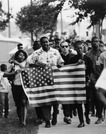
During the 1960s, Milwaukee’s African-American community waged protests, organized boycotts, and fought legislative battles against segregation and discriminatory practices in schools, housing, and social clubs. This exhibits provides highlights from the March on Milwaukee Civil Rights History Project (https://uwm.edu/marchonmilwaukee/), a digital collection that features primary sources including photographs, unedited news film footage, text documents, and oral history interviews from the Milwaukee Area Research Center at the UW-Milwaukee Libraries as well as a detailed timeline and bibliography.
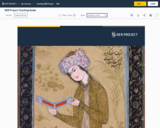
This teaching guide from the OER Project outlines their courses, PD, and other resources.
The OER Project is a coalition of educators and historians committed to boosting student engagement and achievement through transformational social studies programs. By empowering classroom teachers with better curricula, content, and a vibrant community, we deliver more compelling, impactful, and usable histories. “OER” stands for open educational resources. When you grab a free worksheet off Pinterest for your tenth graders, that’s an OER resource. We recognize the value of OER resources, but want to go beyond the typical content repository approach—we aim to improve OER by providing coherency, support, and community.
Currently, the OER Project offers two courses—Big History Project (BHP) and World History Project (WHP)—both of which are completely free, online, and adaptable to different standards and classroom needs. Unlike textbooks, lesson websites, and other commercial products, everything has been purposely built to truly empower teachers and leave traditional history courses in—sorry for the pun—the past. We also offer short, standalone courses for those who want to try the OER Project approach, but aren’t yet ready to take on a full history course. Our current standalone options include Project X, a course that uses data to explore historical trends to help make predictions about the future; Project Score, a course that uses writing tools and the use of Score, a free, online essay-scoring service to help support student writing; and Climate Project, an evidence-based overview of the global carbon problem that culminates in students developing a plan of action they can implement locally
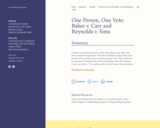
Using the Annenberg Classroom video “One Person, One Vote,” this lesson explores the questions “Does the Constitution require that every person’s vote count the same as another person’s vote? Why would that be important?” Students will use their knowledge of the U.S. Supreme Court cases Baker v. Carr and Reynolds v. Sims to answer these questions.